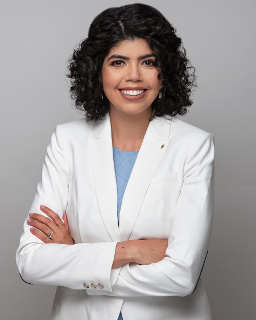Brazilian lawyer thrives via U of A’s program for foreign-trained lawyers
Helen Metella - 28 July 2021

Brazillian-born Elisa Rabello may have been destined to be a lawyer — her grandmother is a retired judge and her parents met in law school — but becoming a lawyer in Canada demanded far more from her than a family tendency to the profession.
After a journey of more than a decade, she’s now articling with McLennan Ross LLP since completing, in the spring, the Internationally Trained Lawyer Pathway at the University of Alberta Faculty of Law, which prepares lawyers educated outside the country to enter Canada’s legal profession.
Rabello is from the city of Goiania in central Brazil, a country where training for the profession consists of a five-year bachelor of law. During school she completed two legal internships — one in a courthouse assisting a criminal law clerk and another helping a judges’ assistant in the Public Treasury department. She was called to the bar in 2014 and worked for 11 months as an associate in a law firm that specializes in employment law. Then she moved to Edmonton with her fiance. Her next hurdles were also time-consuming.
“I did an English class in high school, a very basic class, but when I came to Canada in 2015 my English was terrible,” said Rabello, who speaks Portuguese and French. “I knew some English grammar, but I couldn’t even speak to a waiter in a restaurant.”
To improve her English she volunteered with a child care program run by the Bissell Centre, “learning together with the children,” and then completed the two-year program at MacEwan University to become a legal assistant.
With that credential, she landed a summer job at McLennan Ross LLP and was eventually hired full time as a corporate paralegal. Once her permanent residency was granted she applied to enter the U of A’s accreditation program for internationally trained lawyers in September 2020. Then, another giant hurdle appeared.
Study During Covid
“I submitted my documents in February, and in March everything happened,” she said, referring to the COVID-19 lockdown that abruptly made all studies at the U of A virtual for the 2020 to 2021 academic year.
“They gave us the option to defer, but I’d had my (accreditation) assessment in 2018 and I had already waited two years and you only have five years so … “
Rabello taught herself how to navigate online learning tools and got to work, appreciating how focused her program was and how much assistance she received.
The courses that Rabello was uniquely required to take in order to complete the Federation of Law Societies of Canada’s National Committee on Accreditation (NCA) process without taking the NCA exams were scheduled for her by the Pathway program’s co-ordinator, who also acted as an intermediary with the NCA.
Additionally, said Rabello, “I liked learning in the environment of a class, with someone teaching me what to read, what to prepare for on an exam. That’s much better than me studying on my own, not knowing what to focus on in a 600-page book.”
Getting guidance on how to write a brief of a case was invaluable, since Brazil is a country of civil law, not common law, and Rabello had never before had to create one.
She has high praise for her professors, one of whom offered her a summer job. While she already had employment, knowing that she wasn’t an anonymous student to her instructor buoyed her confidence. The resources of Career Services "was priceless when I was formatting and preparing my resume and cover letter."
Another assist sprang from a student need that the Pathway program’s co-ordinator observed and then addressed. Just after first-term grades arrived, Rabello was heartened to receive a 20-page document on how to succeed in law school, composed by Dana Shamlawi, ‘19 JD, as an accompaniment to a free Zoom workshop. (Another perk of studying in the ITLP is having access to all of the workshops, seminars and online events offered to JD students multiple times a week.)
“I was sad because I knew I studied hard and worked non-stop and my grades were average,” said Rabello .”But her document said, ‘yes, but you’re an average among giants,’ and I realized that everyone was struggling, too.”
That midway boost motivated her to improve her grades in the second term. In July, she began the Accelerated PREP (Practice Readiness Education Program) offered through the Canadian Centre for Legal Education. In September, Rabello officially begins her articling year at McLennan Ross.